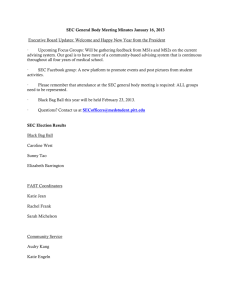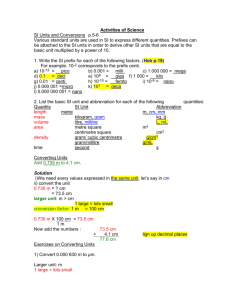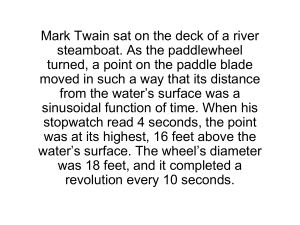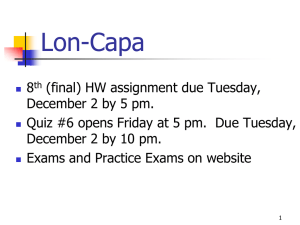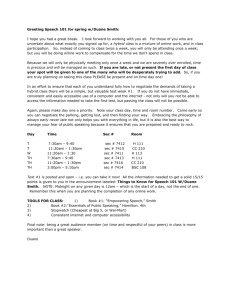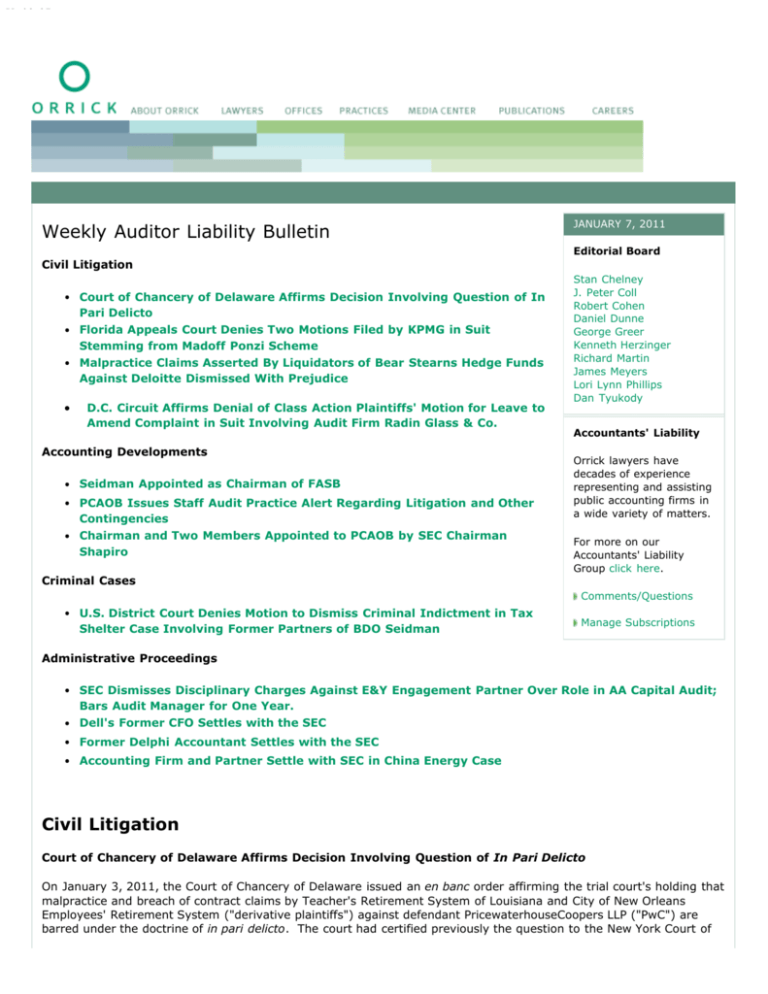
Untitled Page
Weekly Auditor Liability Bulletin
Civil Litigation
Court of Chancery of Delaware Affirms Decision Involving Question of In
Pari Delicto
Florida Appeals Court Denies Two Motions Filed by KPMG in Suit
Stemming from Madoff Ponzi Scheme
Malpractice Claims Asserted By Liquidators of Bear Stearns Hedge Funds
Against Deloitte Dismissed With Prejudice
· D.C. Circuit Affirms Denial of Class Action Plaintiffs' Motion for Leave to
Amend Complaint in Suit Involving Audit Firm Radin Glass & Co.
Accounting Developments
Seidman Appointed as Chairman of FASB
PCAOB Issues Staff Audit Practice Alert Regarding Litigation and Other
Contingencies
Chairman and Two Members Appointed to PCAOB by SEC Chairman
Shapiro
Criminal Cases
JANUARY 7, 2011
Editorial Board
Stan Chelney
J. Peter Coll
Robert Cohen
Daniel Dunne
George Greer
Kenneth Herzinger
Richard Martin
James Meyers
Lori Lynn Phillips
Dan Tyukody
Accountants' Liability
Orrick lawyers have
decades of experience
representing and assisting
public accounting firms in
a wide variety of matters.
For more on our
Accountants' Liability
Group click here.
Comments/Questions
U.S. District Court Denies Motion to Dismiss Criminal Indictment in Tax
Shelter Case Involving Former Partners of BDO Seidman
Manage Subscriptions
Administrative Proceedings
SEC Dismisses Disciplinary Charges Against E&Y Engagement Partner Over Role in AA Capital Audit;
Bars Audit Manager for One Year.
Dell's Former CFO Settles with the SEC
Former Delphi Accountant Settles with the SEC
Accounting Firm and Partner Settle with SEC in China Energy Case
Civil Litigation
Court of Chancery of Delaware Affirms Decision Involving Question of In Pari Delicto
On January 3, 2011, the Court of Chancery of Delaware issued an en banc order affirming the trial court's holding that
malpractice and breach of contract claims by Teacher's Retirement System of Louisiana and City of New Orleans
Employees' Retirement System ("derivative plaintiffs") against defendant PricewaterhouseCoopers LLP ("PwC") are
barred under the doctrine of in pari delicto. The court had certified previously the question to the New York Court of
file:///C|/Users/kxk/Desktop/Weekly%20Auditor%20Liability%20Bulletin%20-%20January%207%202011.htm[12/21/2012 1:27:49 PM]
Untitled Page
Appeals of whether "the doctrine of in pari delicto bars a derivative claim under New York law where a corporation
sues its outside auditor for professional malpractice or negligence based on the auditor's failure to detect fraud
committed by the corporation; and, the outside auditor did not knowingly participate in the corporation's fraud, but
instead, failed to satisfy professional standards in its audits of the corporation's financial statements?" Opinion at 2
(See WALB October 22, 2010). The New York Court of Appeals accepted the certified question and held that the in
pari delicto doctrine would bar such a derivative claim. See Kirschner v. KPMG LLP, 2010 WL 4116609, at *14 (N.Y.
Oct. 21, 2010). The Court of Chancery of Delaware rejected plaintiffs' argument that the issue of imputation of wrongdoing is a
question of Delaware law and thus Kirschner was non-binding. In doing so, the court reasoned that (1) derivative
plaintiffs had acknowledged in their opening brief that New York law governed the issue; and (2) the Kirschner
decision provided a determinative answer of the certified question, which the court must follow. AIG Order.
Florida Appeals Court Denies Two Motions Filed by KPMG in Suit Stemming from Madoff Ponzi Scheme
The District Court of Appeal of the State of Florida, Fourth District, on December 22, 2010, affirmed the lower court's
denial of KPMG's motion to compel arbitration or to dismiss on forum non conveniens grounds in a lawsuit filed by
individuals who participated in limited partnerships that invested with Bernard Madoff. KPMG had sought to compel
arbitration with the investors based on the arbitration clause contained in the audit services agreement for the
partnerships. KPMG argued that the plaintiffs' claims were derivative and arose from those audit services. In
rejecting KPMG's argument, the appeals court found that the arbitration clause did not apply to direct claims by the
individual plaintiffs, who had alleged that they relied on the audited financial statements "in making and maintaining
their investments." The court ruled that plaintiffs therefore alleged individual harm and thus the claims were direct.
The appellate court also affirmed the lower court's denial of KPMG's motion to dismiss based on forum non conveniens
grounds. KPMG had argued that all of its activities occurred in New York where the KPMG audits were performed. In
affirming the denial, the court pointed to the strong presumption that favors a resident's choice of forum and stated
that, absent other factors, the mere fact that KPMG's witnesses and documents were located in another state does not
automatically require dismissal for forum non conveniens. Florida-KPMG.
Malpractice Claims Asserted By Liquidators of Bear Stearns Hedge Funds Against Deloitte Dismissed With
Prejudice
On January 5, 2011, U.S. District Judge Alvin Hellerstein of the Southern District of New York dismissed with prejudice
the malpractice claims asserted against Deloitte & Touche LLP and Deloitte & Touche Cayman Islands by the Cayman
Islands Liquidators of the $1.1B Bear Stearns hedge funds that imploded in the summer of 2007.
Judge Hellerstein held that the Liquidators, who stood in the shoes of the Bear Stearns High Grade Structured Credit
Strategies (Overseas) Ltd. and Bear Stearns High Grade Structured Credit Strategies Enhanced Leverage (Overseas)
Ltd. (collectively, the "Funds") lacked standing to assert claims for damages to investors under the Wagoner doctrine. Under the Wagoner doctrine, which is similar to the in pari delicto doctrine under New York law as recently clarified by
the New York Court of Appeals in Kirschner v. KPMG LLP, (See WALB October 22, 2010 and WALB November 19 ,
2010) the acts of the Funds' agents are imputed to the Funds, unless the agents' actions were entirely adverse to the
Funds. As Judge Hellerstein explained, "the trustee can't sue the accountant because the trustee has the imputed
guilty knowledge of all the insiders of the company," and thus "the trustee can't sue on behalf of investors because
there's no standing to represent the investors." Oral argument transcript at 7-8. Consequently, Judge Hellerstein
dismissed the claims with prejudice and without leave to amend in light of the fact that plaintiffs had already made
four attempts at pleading. Copies of the order dismissing the claims and transcript of the hearing are attached here. (order and transcript).
Orrick represents Deloitte & Touche Cayman Islands in the case.
D.C. Circuit Affirms Denial of Class Action Plaintiffs' Motion for Leave to Amend Complaint in Suit
Involving Audit Firm Radin Glass & Co.
On December 28, 2010, the U.S. Court of Appeals for the District of Columbia affirmed the denial of plaintiffs' motion
to amend their complaint because they failed to adequately allege reliance on audit firm Radin Glass's reports on
InterBank Funding Corporation's financial statements. The plaintiffs filed suit in 2002 against InterBank and Radin
Glass, which had been InterBank's auditor, alleging that InterBank had orchestrated a Ponzi scheme. Defendants
successfully moved to dismiss the action, but the appellate court reversed the dismissal, finding that the district court
had failed to adequately explain its reasoning for dismissing with prejudice. On remand, the district court again
dismissed the complaint, ruling that the plaintiffs had failed to show that they would be able to fix the inadequacies of
their complaint. Plaintiffs appealed, and the appellate court again found that the district court had abused its
discretion by dismissing the plaintiffs' Section 10(b) claim and remanded the case to the district court again. The
file:///C|/Users/kxk/Desktop/Weekly%20Auditor%20Liability%20Bulletin%20-%20January%207%202011.htm[12/21/2012 1:27:49 PM]
Untitled Page
district court denied the plaintiffs' motion to amend their complaint against Radin Glass and dismissed the suit with
prejudice. The district court ruled that an amendment would have been futile as the proposed complaint failed to
adequately plead the reliance element of a securities fraud claim.
On appeal, plaintiffs argued that the presumption of reliance established in Affiliated Ute Citizens v. United States,
406 U.S. 128 (1972), applied to their claims against Radin Glass. Plaintiffs asserted that they should benefit from a
presumption of reliance because their action primarily relies on Radin Glass's alleged omission, i.e., its failure to
disclose InterBank's Ponzi scheme. The court disagreed, ruling that Affiliated Ute's presumption of reliance does not
apply where affirmative misrepresentations have been made. The court found that the basis of plaintiffs' claim was
that Radin Glass affirmatively misrepresented InterBank's financial situation by certifying materially false financial
statements. Because the Affiliated Ute presumption of reliance would not apply to these affirmative
misrepresentations, further amendment to the complaint would be futile. INTERBANK.
Accounting Developments
Seidman Appointed as Chairman of FASB
The Board of Trustees of the Financial Accounting Foundation appointed Leslie F. Seidman as the chairman of FASB on
December 23, 2010. Seidman's appointment is effective immediately. Seidman has been the acting FASB chairman
since Robert H. Herz's retirement on September 30, 2010, and has been a member of the FASB since 2003. Seidman
began her career as a member of the audit staff of Arthur Young & Co. (now Ernst & Young LLP) and later served as a
vice president with J.P. Morgan & Co. in the accounting policies department before becoming a member of the FASB
staff. (http://www.accountingfoundation.org/cs/ContentServer?
site=Foundation&c=FAFContent_C&pagename=Foundation%2FFAFContent_C%2FFAFNewsPage&cid=1176158080171).
PCAOB Issues Staff Audit Practice Alert Regarding Litigation and Other Contingencies
On December 20, 2010, the PCAOB issued a staff audit practice alert entitled "Auditor Considerations of Litigation and
Other Contingencies Arising From Mortgage and Other Loan Activities" to inform auditors of their responsibilities when
auditing loan contingencies, disclosures, and other items. The PCAOB published this alert in response to reports
alleging that companies may have misrepresented the quality of loans sold for securitization. As a result, these
companies may be required to repurchase those mortgages, which could cost the banking industry up to $52 billion. Additional reports have surfaced alleging irregularities in the foreclosure process that could result in even larger
losses. The SEC has issued letters to certain public companies as a reminder of their disclosure obligations regarding
mortgages involved in securitizations. (For a discussion of the SEC's letter, see WALB dated Nov. 5, 2010). The
PCAOB's staff audit practice alert reinforces the SEC's letter and advises auditors that risks and costs associated with
mortgage and foreclosure activities might have other implications, which may include accounting for litigation and
other loss contingencies. (http://pcaobus.org/News/Releases/Pages/12202010_SAPA.aspx).
Chairman and Two Members Appointed to PCAOB by SEC Chairman Shapiro
On January 7, 2011, SEC Chairman Mary L. Shapiro appointed James R. Doty as the new Chairman of the PCAOB and
Jay D. Hanson and Lewis H. Ferguson as new members of the PCAOB. Doty is currently a partner at Baker Botts LLP
and previously served as the SEC's general counsel during the early 1990s. Doty has an LL.B. from Yale Law School,
an M.A. from Harvard University, an A.B. from Oxford University, and a B.A. from Rice University. Hanson is currently
a partner and the National Director of Accounting at McGladrey & Pullen LLP and has been with the firm for over 30
years. In addition, Hanson holds positions with FASB and AICPA. Hanson received a B.A. from Concordia College. Ferguson is currently a partner at Gibson, Dunn & Crutcher LLP. Ferguson had previously served as the first general
counsel of the PCAOB for more than three years. Ferguson received a J.D. from Harvard Law School, a B.A. and M.A.
from Cambridge University, and a B.A. from Yale College. In her announcement, Chairman Shapiro expressed her
thanks for the leadership of Acting Chairman Dan Goelzer during the search for a new Chairman.
(http://www.sec.gov/news/press/2011/2011-4.htm).
Criminal Cases
U.S. District Court Denies Motion to Dismiss Criminal Indictment in Tax Shelter Case Involving Former
Partners of BDO Seidman
The U.S. District Court for the Southern District of New York on December 23, 2010 denied a motion to dismiss filed
by former partners of BDO Seidman and Jenkins & Gilchrist that argued that the criminal indictment had failed to
file:///C|/Users/kxk/Desktop/Weekly%20Auditor%20Liability%20Bulletin%20-%20January%207%202011.htm[12/21/2012 1:27:49 PM]
Untitled Page
allege the element of willfulness. The underlying criminal indictment charged the defendants with aiding and abetting
tax evasion in connection with the design, marketing, and implementation of four tax shelters. The indictment alleged
that the tax shelters lacked economic substance and business purpose and that there was no reasonable possibility for
the tax shelter clients to make a profit, given the duration and structure of the shelters and the fees required to be
paid to obtain the losses. Defendants argued that the indictment failed to allege willfulness because: (1) a
transaction's economic effect is measured by whether it subjects the taxpayer to market risk, not whether it provides
a realistic possibility of profit; (2) there was no known legal duty to account for fees when measuring the profit
potential of a transaction; and (3) the tax strategies used in the tax shelters were not illegal under IRS standards until
after the defendants executed the tax shelters. The court pointed out that to establish criminal tax evasion, the government must prove willfulness, the existence of a
tax deficiency, and an affirmative act constituting tax evasion or attempted tax evasion beyond a reasonable doubt. In rejecting the defendants' first argument, the court stated that while some appellate courts have approved jury
instructions adopting the market risk test, they have also cautioned that this is not subject to an exclusive
formulation. The court ruled that the indictment was not deficient merely because it alleges that the tax shelters
provided no reasonable possibility of profit. The court rejected the second argument because the argument
mischaracterized the duty allegedly breached by defendants. The court ruled that the proper inquiry was whether a
known legal duty existed to avoid claiming deductions based on transactions lacking economic substance. In rejecting
the third argument, the court ruled that the economic substance doctrine was designed to eliminate improper conduct
despite literal compliance with the tax laws. Accordingly, the court held that the indictment adequately alleged a
violation of a known legal duty. The court also held that the defendants' due process argument was misplaced given
that the indictment alleged that the defendants intentionally backdated documents and issued fraudulent opinion
letters. USA v. DAUGERDAS.
Administrative Proceedings
SEC Dismisses Disciplinary Charges Against E&Y Engagement Partner Over Role in AA Capital Audit; Bars
Audit Manager for One Year.
Securities and Exchange Commission Administrative Law Judge Robert G. Mahoney issued an initial decision on
December 28, 2010 that dismissed disciplinary charges against the Ernst & Young LLP ("E&Y") engagement partner
responsible for the 2004 audit of Chicago investment adviser AA Capital Partners, Inc. In the same opinion, the ALJ
found that the manager had engaged in improper conduct under Rule 102(e) and barred her from appearing before
the SEC for one year. In its Order Instituting Proceedings ("OIP"), the SEC alleged that the partner and manager failed to conduct the 2004
audit of AA Capital and AA Capital Equity Fund LLP in accordance with generally accepted auditing standards
("GAAS"). The SEC alleged that their misconduct caused E&Y to issue unqualified audit opinions that included
disclosures not in conformity with generally accepted accounting principles ("GAAP"). Specifically, the OIP alleged that
the partner and manager did not obtain enough competent evidential matter or exercise due professional care
regarding their evaluation and disclosure of a $1.92 million related party "tax loan" to AA Capital's co-owner, John
Orecchio. Rather, the OIP alleged that the two accountants "relied solely on doubtful and unsubstantiated information
obtained from . . . AA Capital's chief financial officer." In his opinion, the ALJ concluded that both the partner and manager violated GAAP and Financial Accounting Standard
57 by failing to ensure that the challenged financial statements disclosed the substance of the transfers of the $1.92
million. The ALJ noted that these transfers were material, related party transactions and thus warranted "heightened
scrutiny." He noted that because the transfers "were outside the normal course of business, and unusual in terms of
size, structure, and purported purposes. . . . [the audit manager] should have recognized this as an area for
investigation, evidenced by her own difficulty understanding the transaction." The ALJ determined that the audit
manager should have applied heightened scrutiny for these transactions, and that her actions went "beyond ordinary
negligence." However, the ALJ did not find that she acted in bad faith and imposed only a one-year sanction on the
audit manager. The SEC had sought three years, because evidence existed that "lowers the risk" that she would
violate professional standards in the future. The ALJ dismissed the charges against the audit engagement partner after concluding that his failure to ensure that
the transfers were disclosed in accordance with GAAP was not highly unreasonable. The partner acknowledged that
the disclosure of the transfers "was not as good as it could have been" but said he believed that it met minimum GAAP
requirements. The ALJ held that although the partner violated GAAP by failing to ensure that the financial statements
disclosed the purpose and substance behind the transfers, his conduct—while unreasonable—did "not rise to the level
of highly unreasonable conduct" within the meaning of Rule 102(e) because of the professional judgment exercised in
evaluating the disclosure. (Initial Decision at: http://www.sec.gov/litigation/aljdec/2010/id411rgm.pdf).
file:///C|/Users/kxk/Desktop/Weekly%20Auditor%20Liability%20Bulletin%20-%20January%207%202011.htm[12/21/2012 1:27:49 PM]
Untitled Page
Dell's Former CFO Settles with the SEC
The SEC suspended James Schneider, Dell's former CFO, from appearing or practicing before the SEC as an
accountant through an order issued on December 22, 2010. The SEC had filed a complaint against Schneider and
several other Dell executives on July 22, 2010 in the U.S. District Court for the District of Columbia. (For a more
detailed discussion of the complaint, see WALB dated July 30, 2010. On October 13, 2010, the court entered an order
permanently enjoining Schneider from future violations of the securities laws and ordered Schneider to pay over $3
million in civil penalties, disgorgement of ill-gotten gains, and prejudgment interest for his role in Dell's alleged
disclosure and accounting violations. Schneider may request that the SEC consider his reinstatement on or after
December 22, 2015. (http://www.sec.gov/litigation/admin/2010/34-63600.pdf). Former Delphi Accountant Settles with the SEC
On December 20, 2010, Milan Belans, a former director of Delphi Corporation, was suspended from appearing or
practicing before the SEC as an accountant for his role in three allegedly fraudulent schemes that resulted in Delphi
filing materially false and misleading financial statements. (For a discussion of the SEC's allegations against Delphi,
see WALB dated September 27, 2010. On December 13, 2010, the court entered an order permanently enjoining
Belans from future violations of the securities laws and ordered Belans to pay nearly $100,000 in civil penalties,
disgorgement of ill-gotten gains, and prejudgment interest for his role in Delphi's allegedly fraudulent schemes. According to the SEC's allegations, Belans assisted in improperly accounting for and disclosing a payment made to its
former parent pursuant to a settlement agreement and improperly accounted for transactions involving inventory as
true sales rather than financing transactions with third parties. Belans may request that the SEC consider his
reinstatement on or after December 20, 2015. (http://www.sec.gov/litigation/admin/2010/34-63578.pdf).
Accounting Firm and Partner Settle with SEC in China Energy Case
The SEC issued an order on December 20, 2010 instituting proceedings against the public accounting firm Moore
Stephens Wurth Frazer & Torbett LLP ("MSWFT") and MSWFT's engagement partner in connection with improper audits
and quarterly reviews of China Energy Savings Technology, Inc.'s financial statements in 2004 and 2005. According
to the SEC, MSWFT and its partner failed to exercise heightened skepticism and due professional care in performing
their work. Among other things, the SEC noted that MSWFT and its partner knew of significant problems with China
Energy's internal controls, learned information during its 2004 audit engagement that contradicted disclosures in
China Energy's annual reports, and encountered difficulties in performing important audit procedures. The SEC found
that China Energy had misstated earnings per share in 2004 and had improperly recognized revenue in 2005. The
SEC also found that MSWFT and the partner violated professional standards in reviewing 2005 quarterly financial
statements with respect to significant sales transactions.
In accepting the respondents' settlements, the Commission found that MSWFT and the partner had engaged in
improper professional conduct under Rule 102(e). MSWFT was ordered to retain an independent consultant to review
and evaluate the audit and interim review policies and procedures of MSWFT regarding a number of topics including
client fraud detection training, auditor independence, and acceptance and retention of clients. The independent
consultant will issue a report to MSWFT, and MSWFT will adopt the recommendations of the independent consultant as
soon as practicable. MSWFT and the engagement partner were also ordered to cease and desist from violating the
securities laws and ordered to pay over $100,000 in disgorgement and prejudgment interest. MSWFT was also
censured. Finally, the engagement partner was barred from appearing or practicing before the SEC as an accountant,
but can request reinstatement on or before December 20, 2012. (http://www.sec.gov/litigation/admin/2010/339166.pdf). Permission is granted to make and redistribute, without charge, copies of this entire document provided that such copies are
complete and unaltered and identify Orrick as the author. All other rights reserved.
To ensure future delivery of Orrick communications, please add publications@orricklawfirm.com to your safe sender list or address
book.
You are receiving this communication because we believe you have an existing business relationship with Orrick or have previously
indicated your desire to receive such communications. You may unsubscribe from future messages by adjusting your subscription
preferences or be removed from all mailing lists by e-mailing unsubscribe@orrick.com.
IRS Circular 230 disclosure: To ensure compliance with requirements imposed by the IRS, we inform you that any tax advice
contained in this communication, unless expressly stated otherwise, was not intended or written to be used, and cannot be used,
for the purpose of (i) avoiding tax-related penalties under the Internal Revenue Code or (ii) promoting, marketing or recommending
file:///C|/Users/kxk/Desktop/Weekly%20Auditor%20Liability%20Bulletin%20-%20January%207%202011.htm[12/21/2012 1:27:49 PM]
Untitled Page
to another party any tax-related matter(s) addressed herein.
This publication is designed to provide Orrick clients and contacts with information they can use to more effectively manage their
businesses and access Orrick's resources. The contents of this publication are for informational purposes only. Neither this
publication nor the lawyers who authored it are rendering legal or other professional advice or opinions on specific facts or matters.
Orrick assumes no liability in connection with the use of this publication.
Attorney advertising. As required by New York law, we hereby advise you that prior results do not guarantee a similar outcome.
2011 Orrick, Herrington & Sutcliffe LLP, 51 West 52nd Street, New York, NY, 10019-6142,
+1-212-506-5000.
file:///C|/Users/kxk/Desktop/Weekly%20Auditor%20Liability%20Bulletin%20-%20January%207%202011.htm[12/21/2012 1:27:49 PM]




